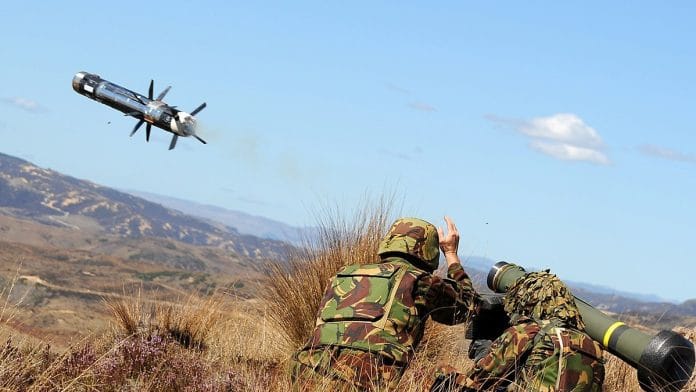New Delhi: India is set to import more of the specialised Excalibur precision-guided artillery munition—used against Pakistan during Operation Sindoor—and the Javelin anti-tank missile system under emergency procurement from the US, at a total cost of nearly USD 93 million.
This is being seen as a first in a series of defence deals to be signed with Washington, DC, in the coming months and comes weeks after both countries signed a 10-year framework to deepen bilateral defence relations. The signing took place in Kuala Lumpur at a meeting between Defence Minister Rajnath Singh and his US counterpart Pete Hegseth.
The deals, pursued under emergency procurement powers, allow the armed forces to bypass the convoluted and long procurement process for contracts, with a maximum ceiling of Rs 300 crore, have been approved by the US State Department under the Foreign Military Sales (FMS) route.
FMS is a government-to-government deal that Washington, DC, enters.
Excalibur is fired from the M-777 Ultra Light Howitzer, a specialised artillery gun, 145 units of which India had bought almost a decade ago.
While these guns were originally meant to be deployed in the Northeast, following the Pahalgam attacks, the Indian Army flew some of them to the Line of Control with Pakistan.
While nine Pakistan-based terror camps were targeted by the Indian Armed Forces on 7 May this year, only two were hit by the Indian Air Force. Indian Army hit the remaining seven, mostly using the M777 guns with the Excalibur.
Interestingly, Colonel Koshank Lamba was awarded the Vir Chakra for executing the first-ever air mobilisation of a specialised equipment battery, thereby ensuring its timely inter-command induction into the ‘Operation’ under complete secrecy.
This was the M777, as reported by ThePrint earlier.
According to a notification to the US Congress by the Defence Security Cooperation Agency, the Government of India has requested up to 216 of the M982A1 Excalibur tactical projectiles for purchase.
The deal includes ancillary items: Portable Electronic Fire Control Systems (PEFCS), along with their Improved Platform Integration Kit (iPIK), as well as primers and propellant charges. Government technical assistance, technical data, repair and return services, and other related elements of logistics and programme support are also included. The estimated total cost is $47.1 million.
The US Defence Security Cooperation Agency added that the proposed sale would support the foreign policy and national security objectives of the United States by helping to strengthen the US-Indian strategic ties and the security of a major defence partner. India continues as a significant force for political stability, peace, and economic progress in the Indo-Pacific and South Asia regions, it said.
The proposed sale will not only improve India’s capability to meet current and future threats through precision capability equipment, but also increase first-strike accuracy in its brigades, the agency further said.
The Javelin missile deal
In a separate filing, the Defence Security Cooperation Agency informed that the State Department had determined to approve a possible Foreign Military Sale to India of the Javelin Missile System and related equipment for an estimated $45.7 million.
The GoI requested 100 FGM-148 Javelin rounds, one Javelin FGM-148 missile—fly-to-buy—and 25 Javelin Lightweight Command Launch Units (LwCLU) or Javelin Block 1 Command Launch Units (CLU).
The deal will also include trainers. Missile simulation rounds, battery coolant unit, interactive electronic technical manual, Javelin operator manuals, and lifecycle support, as well as physical security inspections, spare parts and systems integration and checks, are also included.
Sources explained that this was just a one-off emergency procurement deal while both countries work on closing a contract for joint manufacturing of the Javelin missiles in India.
In June 2024, ThePrint reported that the deal expanded to an Israeli system, and soon, an indigenous solution, 15 years after the initial decision. But India and the US are now back at the negotiating table for the joint production of the shoulder-mounted Javelin anti-tank guided missiles.
It is learnt that in July this year, India submitted a proposal for the co-production of the Javelins.
India’s Bharat Dynamics Limited (BDL), in February this year, signed an agreement with the Raytheon/ Lockheed Martin-owned Javelin Joint Venture (JJV) to explore the opportunities for joint manufacturing of the Javelin ATGMS in India.
Lockheed Martin, at the time, said that it would “allow the JJV to evaluate the possibility of manufacturing Javelin in India, fulfilling potential future requirements of the Indian Ministry of Defence and strengthening its anti-tank capabilities.”
Weighing approximately 15.9 kg and shoulder-fired by a single soldier, the Javelin is one of the world’s most advanced anti-tank weapons, extensively used in the Russia-Ukraine war.
(Edited by Madhurita Goswami)
Also Read: F-35, P8i, Stryker & Javelin to nuclear, AI & pharma—big strategic takeaways from Modi-Trump meet






